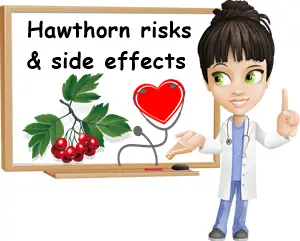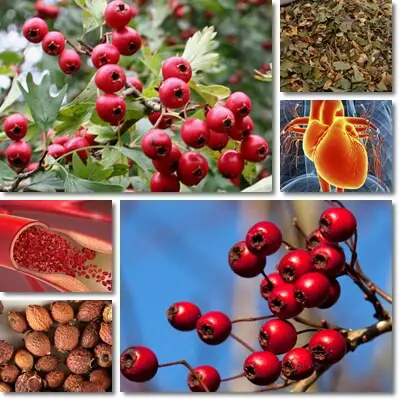Hawthorn is a medicinal herb used therapeutically for the management of congestive heart failure and for high blood pressure treatment.
Often times, hawthorn is used as an adjuvant alongside traditional therapies to potentiate the effects of conventional medication.
But hawthorn too can be a source of side effects, especially when used as a complementary treatment in cardiovascular disease.
What are the side effects, health risks and contraindications of hawthorn and how to best use hawthorn to limit its negative effects and potential health risks?
What are the benefits of hawthorn?
Hawthorn supplements, extract, tea and other preparations have scientifically proven cardiotonic properties, supporting the cardiac function, with benefits for heart failure.
Studies demonstrate hawthorn has a vasodilating action with blood pressure lowering effects and supports and improves blood circulation.
The cardiovascular benefits of hawthorn are documented scientifically, with studies identifying proanthocyanidins and other flavonoids and antioxidants as the main source of the therapeutic action of the plant.
Also see the benefits of hawthorn for high blood pressure.

9 Side effects, risks and contraindications Of Hawthorn
1) Risk of allergic reactions
Essentially any plant can cause an allergic reaction which is when a person’s immune system overreacts to a component in the plant (e.g. pollen, a protein etc.), triggering a cascade of reactions that affect multiple systems and organs, from the skin and the mucous membranes of the eyes, nose and throat to the lungs, digestive system and heart.
Allergic reactions are dangerous because they can cause swelling which can impede breathing, resulting in anaphylactic shock and even death unless life-saving medication is administered in a certain window of time (which may range from minutes to hours).
Hawthorn too can cause an allergic reaction with the potential for anaphylactic shock, but is not as common a allergen as milk, eggs, sesame, soy, peanuts or nuts in general, or ragweed pollen. A hawthorn allergy can occur in response to eating the fresh or undercooked berries, taking dietary supplements made from dried hawthorn berries, flowers or leaf material or drinking tea made from one or more plant parts. A hawthorn allergy is more likely if you are also allergic to other Rosaceae or Rose family plants such as rose hips, strawberries, cherries etc. Find out more about cherry allergy.
2) Increased risk of bleeding
The anticoagulant properties of hawthorn have been documented scientifically with studies showing hawthorn alters coagulation parameters and reduces platelet aggregation (source).
While this is good for reducing risks of blood clots and associated cardiovascular events in those with a predisposition for blood clot formation, it also indicates a higher risk of bleeding.
As a result, it is strongly recommended to discontinue consumption of hawthorn preparations such as capsules, extracts or other types of hawthorn supplements, but also hawthorn tea 1-2 weeks before major surgery to reduce risks of bleeding.

3) Medicine interactions: anticoagulants
If you are currently receiving treatment for blood clotting (e.g. warfarin), know that taking hawthorn concomitantly with anticoagulants can increase the effects of the anticoagulants. The interaction is dose-dependent and the side effects may range from modest to severe, depending on the anticoagulant therapy and how much hawthorn is consumed. Talk to your doctor about how safe it is for you to consume hawthorn supplements, extract or tea if you are currently on anticoagulants, and what would be a safe amount for you.
4) Medicine interactions: high blood pressure medication
Hawthorn is known to interact with medication used for the treatment of high blood pressure, including, but not limited to: beta-blockers, calcium channel blockers, ACE (angiotensin converting enzyme) inhibitors and blockers etc.
The side effects are dose dependent and stem from bioactive chemicals in hawthorn potentiating the effects of the hypertension medication.
While hawthorn is beneficial, serving as an adjuvant to the blood pressure lowering therapy, it can also be a source of health risks causing dangerously low blood pressure numbers.
5) Low blood pressure
It is possible to experience a significant drop in blood pressure after consuming hawthorn preparations, including hawthorn supplements and hawthorn tea.
Hawthorn is scientifically proven to lower blood pressure, and is a quite effective blood pressure lowering agent. However, in normotensive individuals or individuals with low blood pressure it can cause dangerously low blood pressure numbers.
Symptoms may include lightheadedness, dizziness, a fainting sensation or the feeling of a buzz. The side effects are dose-dependent so the more hawthorn you take, the lower the blood pressure. It is important to discontinue consumption immediately and seek medical help if you are feeling progressively worse.
6) Other medicine interactions
Hawthorn preparations such as hawthorn supplements (pills, capsules, extracts) and even tea can interact with medication for the treatment of heart failure, angina, arrhythmia, high cholesterol and more. Hawthorn works by dilating blood vessels and increasing blood flow to the heart, regulates contractions of the heart muscle and decreases heart rate. It thus achieves benefits for heart failure, angina pectoris, arrhythmia and associated symptoms. But taking hawthorn together with conventional medication can result in interactions, namely hawthorn potentiating the effects of the medication. Talk to your doctor first if you are considering taking hawthorn and are currently being treated for any form of cardiovascular disease.
7) Cardiovascular side effects
Taking too much hawthorn, even in the absence of a cardiovascular pathology or medication for the treatment of a cardiovascular pathology, can result in side effects such as: lower than normal blood pressure numbers, lightheadedness, dizziness, fainting, palpitations, altered heart rate, fatigue and more.
8) Side effects affecting the nervous system
It is possible to experience increased alertness, agitation, anxiety and even panic attacks as a result of taking too much hawthorn, whether supplements, extract or tea. Of course, there are also benefits to taking hawthorn in reasonable amounts, with doses suited to individual needs. Also see the benefits of hawthorn tea.
9)Digestive side effects
Hawthorn can cause digestive side effects such as nausea, stomach cramps, loose stools and diarrhea. In some instances, the digestive side effects can be caused by an allergic reaction to hawthorn.
Seek medical help if you also experience any of the following symptoms: itchy skin rash, swelling of the lips, tongue or throat, difficulty breathing with closing of the airways, hoarseness or wheezing, shortness of breath, dizziness, confusion, fainting sensation.
Conclusion
Hawthorn is a wonderful medicinal herb with multiple therapeutic applications. It is widely recognized as an effective adjuvant in cardiovascular disease treatment in all its forms: extracts, supplements, tea. But because it has the same effects as conventional medication used for the treatment of high blood pressure, arrhythmia, congestive heart failure, high heart rate etc., it interacts with the medication, typically potentiating its effects, and causes a range of side effects. The side effects are, for the most part, dose-dependent, but can be avoided. It is important to talk to your doctor about a safe dose for you if you are considering hawthorn as a complementary treatment in cardiovascular disease.
